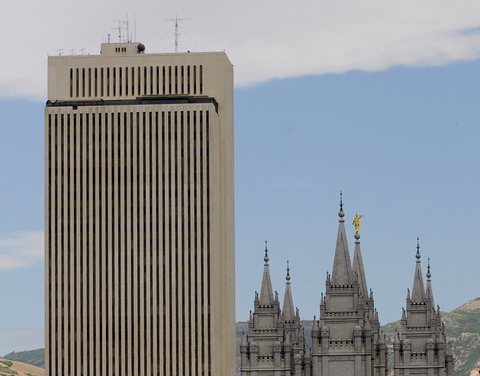
At a conference on Mormonism and American politics at Columbia University in New York on February 3rd and 4th, Campbell said that Mormons will likely promote Romney in an unofficial manner through networks among families and fellow believers.
In presenting findings from new surveys conducted among American Mormons, Campbell said that they show a “moderate and pragmatic” tendency in Mormonism that separates it from much of the religious right. Campbell presented findings from the newly completed “Peculiar People Survey,” which polled 500 Mormons in the U.S. on a wide range of social and religious issues. He finds that Mormons are distinctive in their approach to immigration and other controversial moral issues; while they are more Republican than other religious groups, they show more pro-immigrant attitudes than any other believers aside from Jews. The Mormons were more likely than Catholics and evangelicals to allow for exceptions in the cases of dangers to the health of the mother and rape.
Campbell said that one of the more unexpected findings is that there is significantly less politics preached from Mormon pulpits than in other religious groups. The survey found that Mormons do discuss politics, but such discussions take place outside of their churches. Mormons can also be mobilized relatively rapidly, especially when leaders endorse a social cause and when all the general authorities of the church present a united front on an issue. This was the case with the strong Mormon activism generated against Proposition 8, a measure seeking to overturn the ban on gay marriages in California in 2008.
Joanna Brooks of San Diego State University noted that Mormons only represent two percent of the population in California but they provided 50 to 70 percent of the funding to fight for the anti-Proposition 8 cause. She said that Mormons saw the measure as an “assault on Mormon temple marriages,” and fought back through direct church involvement, including letters from church officials being read from pulpits and engaging in activism through “horizontal kinship networks” and connections to LDS ecclesial structures. But Brooks said it was unlikely that the church would be willing or able to mobilize its members against similar measures in various states of the country, such as Minnesota.
In another presentation at the conference, Phillip Barlow of Utah State University cast skepticism on the media claims of a direct relationship between Mitt Romney’s Mormon beliefs and his presidential campaign. He said there is not so much theology but a good deal of Mormon history that marks Romney’s life and career, such as the sense of struggle he and his family experienced as they uprooted themselves from a Mormon settlement in Mexico. Even on questions of American exceptionalism and the U.S. Constitution, which Mormons believe is an inspired document, there is not a notable difference between Romney and the other Republican candidates or even President Barack Obama, he added. Barlow, who was a counselor to Romney when he was a bishop in the Boston area, recalled that the future candidate, acted in a “pastoral and pragmatic way…with good will and honesty.”
Several speakers at the conference acknowledged that Romney’s Mormon identity and worldview is less on display in the current campaign compared to 2008 when he first ran as a Republican candidate. Historian Jan Shipps, a specialist on Mormonism, said that Romney has stopped using evangelical language to describe his faith, since that “didn’t work; now he just doesn’t bring [his Mormonism] up.” But she predicted that the resistance evangelical Protestants had previously shown toward Romney will be far less in the 2012 election. Even in the conservative Protestant U.S. South, voters “will hold their noses and vote for him as a funny kind of Christian rather than vote for Obama.”
Richard Cimino